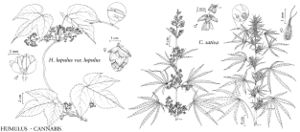Cannabaceae
Herbs, annual or perennial, taprooted or rhizomatous, erect or twining, aromatic, pubescent with small glands and hairs, hairs with or without cystoliths (structures within cells with basal calcium carbonate concretions or crystals). Stems usually branched, usually ridged or furrowed. Leaves decussate proximally, often alternate distally, simple to palmately lobed or compound, petiolate; stipules persistent, triangular. Leaf-blade: margins serrate. Inflorescences axillary or terminal, bracteate; staminate inflorescences compound cymes or panicles, loose, erect or somewhat pendent; pistillate inflorescences spikes, pseudospikes, or racemes. Flowers unisexual, staminate and pistillate usually on different plants, when on same plants (in some populations and cultivars), then staminate flowers produced before pistillate flowers, transitional-bisexual flowers sometimes occurring. Staminate flowers 20-200+, pedicellate; sepals 5, hypogynous, greenish or whitish; stamens 5, hypogynous, opposite sepals; anthers dehiscing longitudinally and basipetally. Pistillate flowers 10-50, often paired, pairs often interpreted as cymes, subsessile, tightly covered or loosely subtended by bract or bracteole; perianth a thin undivided layer adhering to ovary, obscure; pistil 1, usually 2-carpellate; ovary superior, 1-locular; ovule 1 per locule; style short, apical; stigma 2-branched, long, filiform. Fruits achenes, crustaceous, covered loosely or tightly by persistent, accrescent perianth. Seeds fleshy; endosperm little; embryo curved or coiled.
Distribution
Nearly worldwide
Discussion
Genera 2, species 4 (2 genera, 3 species in the flora).
Genera in Cannabaceae have sometimes been included in Moraceae (H. A. Gleason 1968); M. L. Fernald (1950) placed them in a separate family, Cannabinaceae.
Cannabaceae are wind pollinated. They are indigenous to the temperate Northern Hemisphere, widely cultivated, often introduced, and often ruderal.
Cystoliths, including those of Cannabis sativa, are frequently used in police laboratories to make positive identification of leaf fragments.
Selected References
None.
